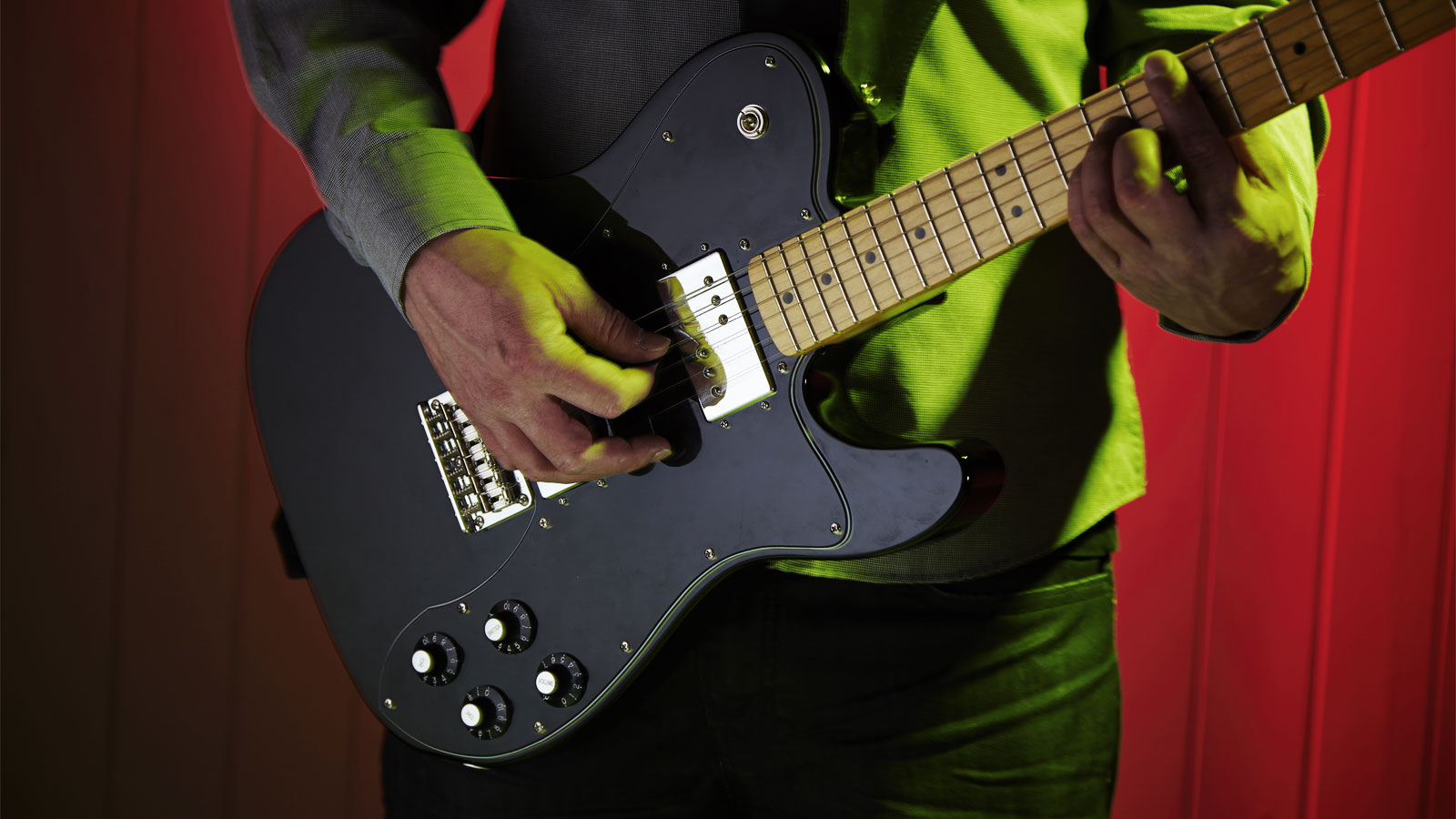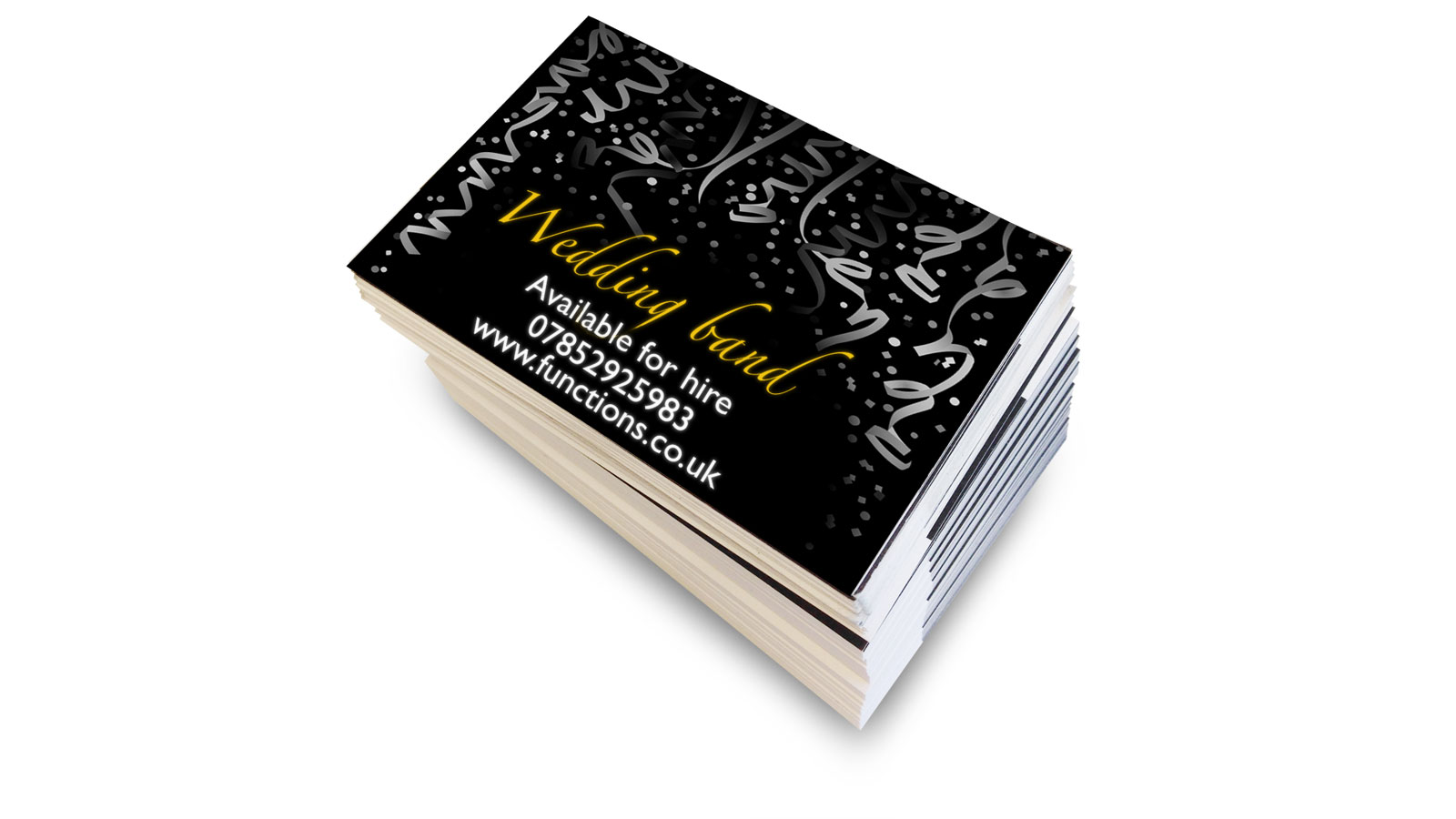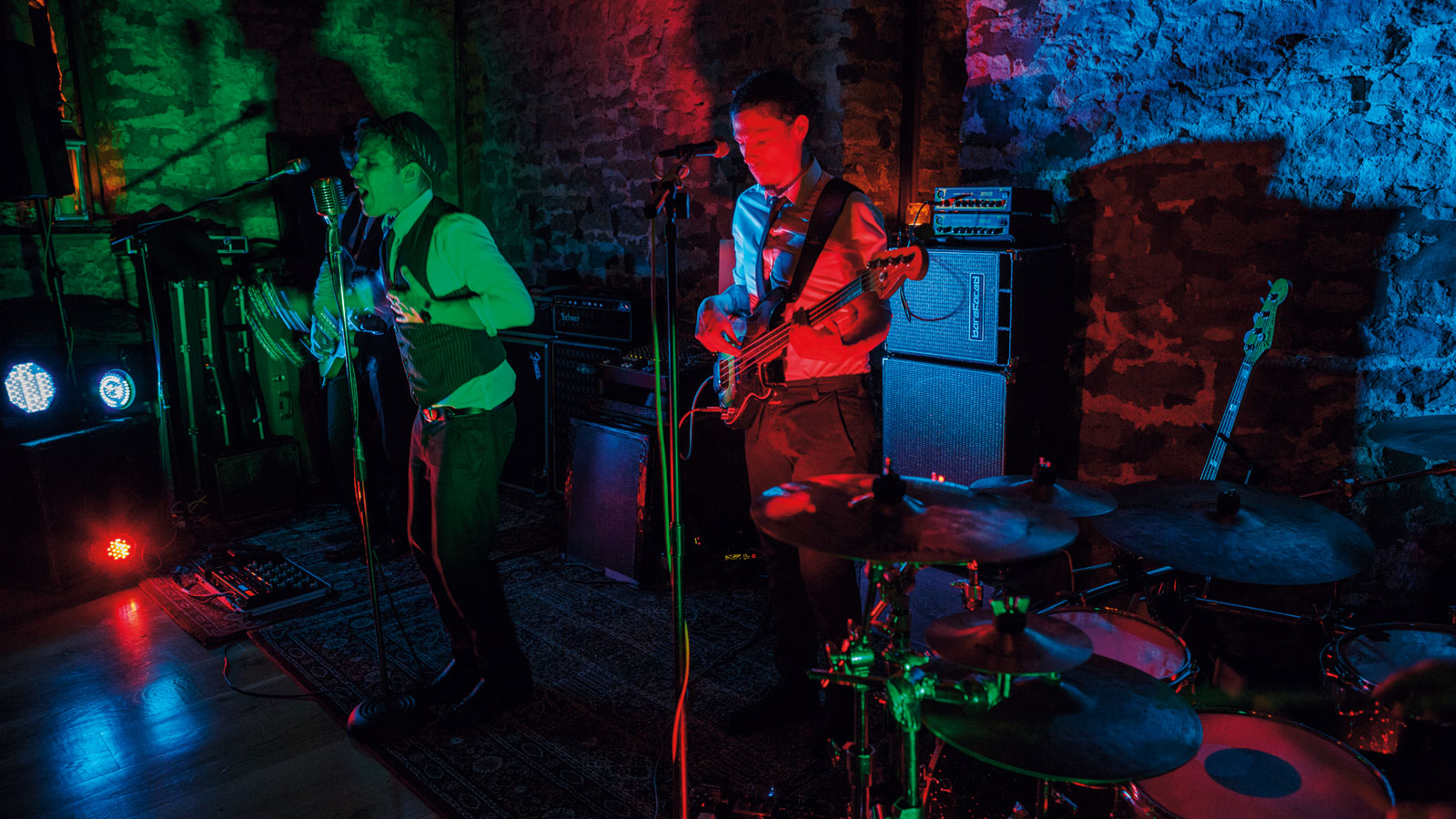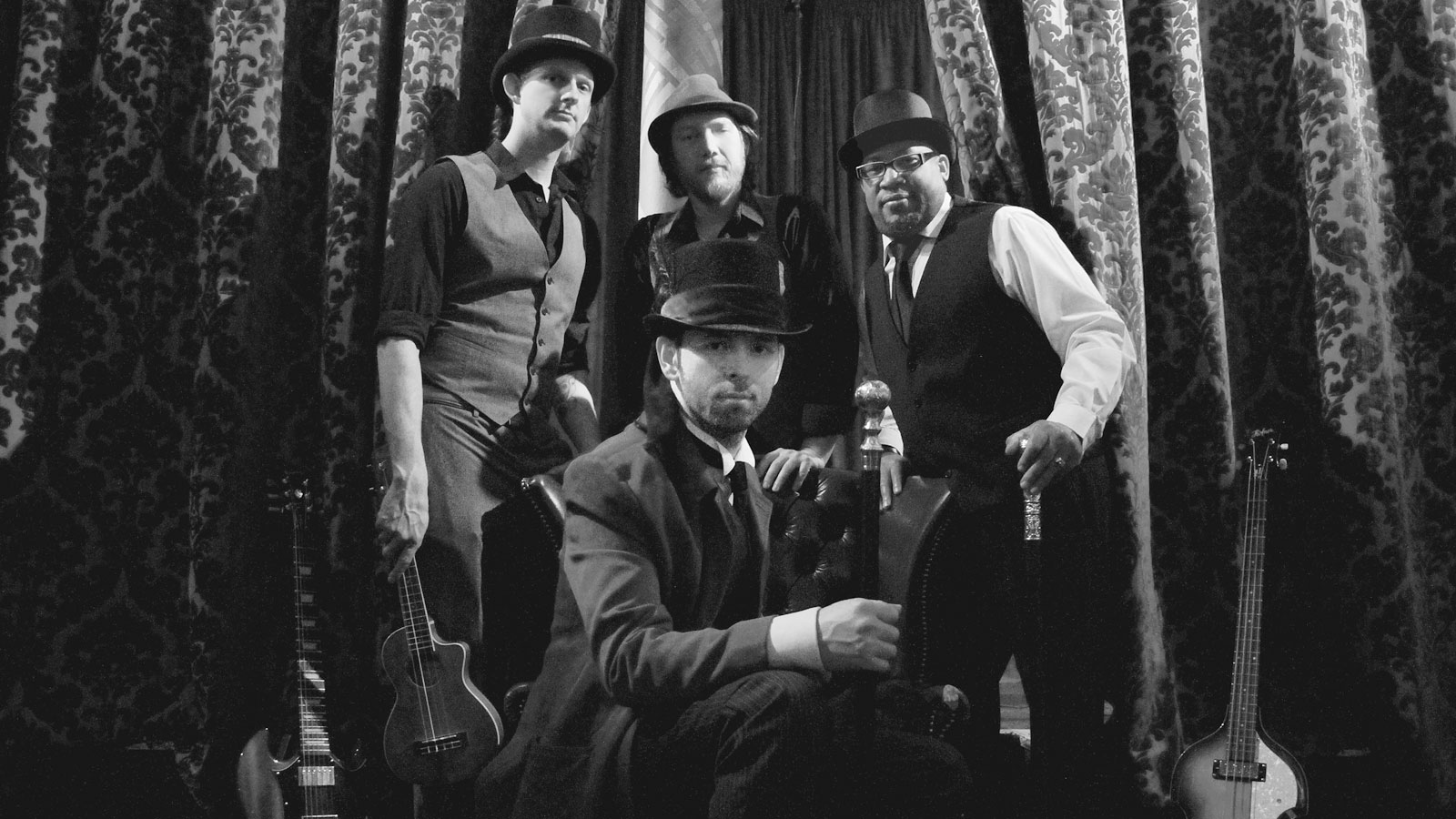How to start a function band
Get out playing gigs and earn some tidy cash doing it...

Do you fancy getting paid decent money to play gigs where the audience will always be happy and will dance, sing along and scream at you to keep playing? If the answer to that question is 'Yes', you'll want to start a function band.
Ollie Thomas is one quarter of successful South West wedding band, The Zu Zu Men, playing a range of popular music in a unique style. Here, Ollie explains just what it takes to do it properly...
How long have you been playing in function bands?
"I've been playing in function bands for around seven years. This particular band has been going for around three years, but I was playing in another for four years. With this one, we were just playing small gigs in bars; it was a lot of fun, so we decided to do it properly and see if there was a way of making a living out of what we enjoyed doing."
"We do public gigs, too - festivals and regular pub gigs, which are great adverts"
How many gigs do you play in an average month?
"We do two wedding gigs a week during the summer, so usually seven or eight in a month. On top of that, we do public gigs, too - festivals and regular pub gigs, which are great adverts. If someone's having a wedding and they want to come and see if you're what they want, they can."
Do you pick up a lot of new gigs from the public ones?
Want all the hottest music and gear news, reviews, deals, features and more, direct to your inbox? Sign up here.
"Yes, because unless people are at a wedding then they're less likely to see you. Often, people at our regular gigs will approach us for their wedding, or their friend's wedding. So it's a good idea to have cards you can give to them with your contact details on it, and not just say 'Well, here's my number'.
"You need to be ready for that eventuality. If you're prepared and you're representing yourself well, then it's more likely people will come back. If you're writing your name on someone's hand or something like that it could wash off, and it's not a good look!"

Business cards are essential - they will help you get gigs
What do you do outside of the 'wedding season'?
"It does drop off - some people do like to get married in winter, but not as many - so if you're trying to make a living from this, then you'll want to book in lots of bar gigs during winter. But the business never stops, because that's when people start to get their weddings together."
Do you find more and more people are having weddings during weekdays?
"Yeah, that's definitely true. It's opening up a lot more than I expected. So you have to be ready for the weekday ones, especially if you or any of your band members have other jobs. You normally have to take the next day off because you won't finish until 2am or something."
"If you limit the styles you play then you're potentially limiting the number of gigs you're going to get"
Do you specialise in any kind of music?
"No, we make a point of not specialising in any kind of music. If you limit the styles you play then you're potentially limiting the number of gigs you're going to get.
"If you're a function band then you have to accommodate everyone of all ages, because you never know what kind of audience you're gonna get. So the more styles and songs you can play, the more likely it is people are going to latch on to you.
"You can't be too precious about that sort of thing and get too 'muso' about it. A lot of bands and musicians take themselves very seriously, and although what you do should and has to be taken seriously, that side of things should be left behind closed doors.
"If you go to play at a wedding thinking you're Radiohead, then you're gonna find yourself some stumbling blocks. The idea is that you want to make people smile and dance, so you can't take yourself that seriously. It won't work."
How many songs do you have in rotation?
"Hundreds! We tend to learn songs along the way. We've got maybe 200 to 300 songs that we have on rotation to fall back on. We never stick to a setlist, instead we tend to read the audience - what they're reacting to and what they like. We're always adding to the set, too."
Is there a song that comes up as a request at every gig?
"Yeah, there's always three or four songs that we get asked for. Mr Brightside has got to be number one, it comes up over and over again. We get asked for Stereophonics quite a lot, and Arctic Monkeys and The Jam too."
How do you go about selecting the songs you learn?
"In the beginning, we put a set together from songs that we'd all learnt in previous bands. For the ongoing stuff, it's the ones that people request the most, plus you hear stuff on the radio, or remember an old tune you like. Sometimes, we'll all put 10 songs forward, then from those 40 we choose the ones that work the best. We might learn 40 songs and then only really carry on with 10 or 15 of them."
Do you have to learn a new 'first-dance' request for every wedding you do?
"Yeah usually, probably about 70 per cent of the time. We actually offer that as part of our fee. Within reason, I mean if there's an orchestral piece or something then we might have to say 'Umm, could you maybe just do Is This Love or something?' But it's beneficial to do that, because it's nice for people to have something played especially for them, because it's their day."

Make sure you get your look right and you'll stand out from the competition
Your band has quite a strong look, is this an important thing for bands to consider?
"Yeah, I think it's important to have a look or a style that sets you apart, as with any business. I think you need to make it an event for the people that are booking you. It should stand out, and you're entertaining people so it's important to be entertaining. And it gives some sort of uniformity to what you're doing. You can't very well turn up to a wedding in a pair of shorts and a baseball cap."
Do you need to cover a lot of bases sonically?
"Not too much. I keep it quite simple, I have a few pedals; a reverb and delay, an overdrive and a wah - which I hardly ever use. My amp is a Fender Twin, so I use a boost to drive it a bit harder. We bring spare guitars with us, but only really in case a string goes."
Do you worry about making sure you use the right gear for the song?
"It doesn't matter too much about the absolute specifics of a sound. I think it depends on the player. I've got a Strat and an SG, we just try to play the song right and get the tones right on whatever you're using. It saves time with swapping around guitars, but you don't need to be too precious. People aren't really going to be listening out for that, apart from other musicians and the band.
"We do songs in our own style as well, so it's less about the sound; as long as the people are enjoying it and we're playing it right then that's what's important."
So people are looking out for the parts that they recognise, rather than the specific sounds?
"Exactly. For example, we play Take On Me sometimes, and I learned the main riff on guitar and play it distorted. It's the riff that they notice, not that it was originally played on a keyboard!"
Talk us through the average wedding gig...
"Usually, people want us to start playing at about eight-ish. What that means for us is that we have to pick up our gear at about 3pm, load up and drive to the venue. If it's relatively local, it's normally about an hour's drive. We'll try to get there for around 6pm. Once they've finished their meal and speeches we'll get in and start setting up. It usually takes about an hour-and-a-half to set up all of our gear and do a quick soundcheck.
"Then we'll play the first dance, and straight into the first set. Usually, we do an hour then have a break, then another hour to 90 minutes. Then we pack down, which takes about an hour. We'll normally be heading out by about 12:30, then once we've driven back to where we store our gear, we pack it all back in. So we're not usually finished until about 2/2.30am."
"We split up the fee into our percentages for each member, then a percentage goes back into the band"
Do you give a breakdown of what you'll provide?
"Yeah, absolutely. It's important for people to know what they're paying for. Even if they just want a general quote, I tend to send through a list of every eventuality. For example, we're a four-piece, but we can also play as a three-piece - of course, this costs less. And underneath, we'll say 'For this amount, you'll be getting:', with bullet points, and include the insurance, lighting and length of time, etc. It's just better that way because then everyone is clear about what they're getting and it saves problems down the road."
Do you have insurance for your gear, and liability?
"Most venues will want to see at least public liability insurance (PLI). Some will want PLI and PAT testing certificates for your gear. You kind of have to get that, because even if they don't always ask for it, maybe half of them will. That's a definite need. Usually, it's not too expensive, and you're covered for millions of pounds' worth of accidents!"
What about shared costs for the band?
"With all of the gigs that we do, we split up the fee into our percentages for each member, then a percentage goes back into the band. So we'll use that money to pay for band equipment and insurance. It's up to us individually for our own gear."

A decent photo or two is well worth the investment and shows you are professional
5 essential tips for all function bands
Guitarist and vocalist Ollie Thomas on the dos and don'ts of playing in a function band
1. Set your goals
Before you venture too far down the route of becoming a function band, make sure that every band member is onboard with what it takes.
"Make sure that everyone in the band is on the same page from the start. Not only that everyone has the time to do it, but that they have a similar vision for what you're doing. How often you'll be gigging - if you're successful, you can forget about weekends - where you want to take it. Otherwise, it can get pretty messy.
"You've got to make sure that you're with people that you get along with, and that if there are any problems then you can discuss them properly without ruining your friendship, thus ruining the band."
2. Build your web
For most people, booking a wedding band is a huge deal. Make it easy for them by building a website with shots, sound clips and videos of your band. Team up with a budding wedding photographer, and you might even save some cash!
"Having a good online presence is important, too, with a website, Facebook, etc. It's worth investing a little bit on that with photos, too. Put demos on your site from Soundcloud or YouTube - potential clients can see that you can actually do it."
3. Play the part, not the tone
Chances are, the type of music you will be playing may have hooks and riffs that weren't written for guitar. If you can't replicate the sound exactly, fear not!
"If it's recognisable and it sounds good, it's fine. It's the song that you're learning, if there's a hook that people are going to automatically latch on to then it's important that you get that right."
4. Get equipped
PA systems, lights, microphones for speeches, these are all things that are commonly requested.
"It's really good to be self-sufficient if you can be. If somebody books you, you want to be able to give them as easy a ride as possible. You learn a lot along the way. You'll find that people ask the same sort of things, and those are the things that you have to listen to because those are the things that will get you booked or not booked. If it's a reasonable request and you can do it, then do!"
5. Offer additional entertainment
Once the speeches are done, the band is the backbone of the rest of the event, but what about music when you're not playing?
"We bring an iPod that has a mix of general wedding/background music. Just fun, inoffensive party music that's not already in our set. If they have a set on an iPod that they want, then we can just plug it in. Sometimes, they'll want to have music after we've played, too, so we'll leave the PA set up while we pack everything else down, and agree that once we're finished with everything else then we'll pack the PA down."
Total Guitar is Europe's best-selling guitar magazine.
Every month we feature interviews with the biggest names and hottest new acts in guitar land, plus Guest Lessons from the stars.
Finally, our Rocked & Rated section is the place to go for reviews, round-ups and help setting up your guitars and gear.
Subscribe: http://bit.ly/totalguitar
